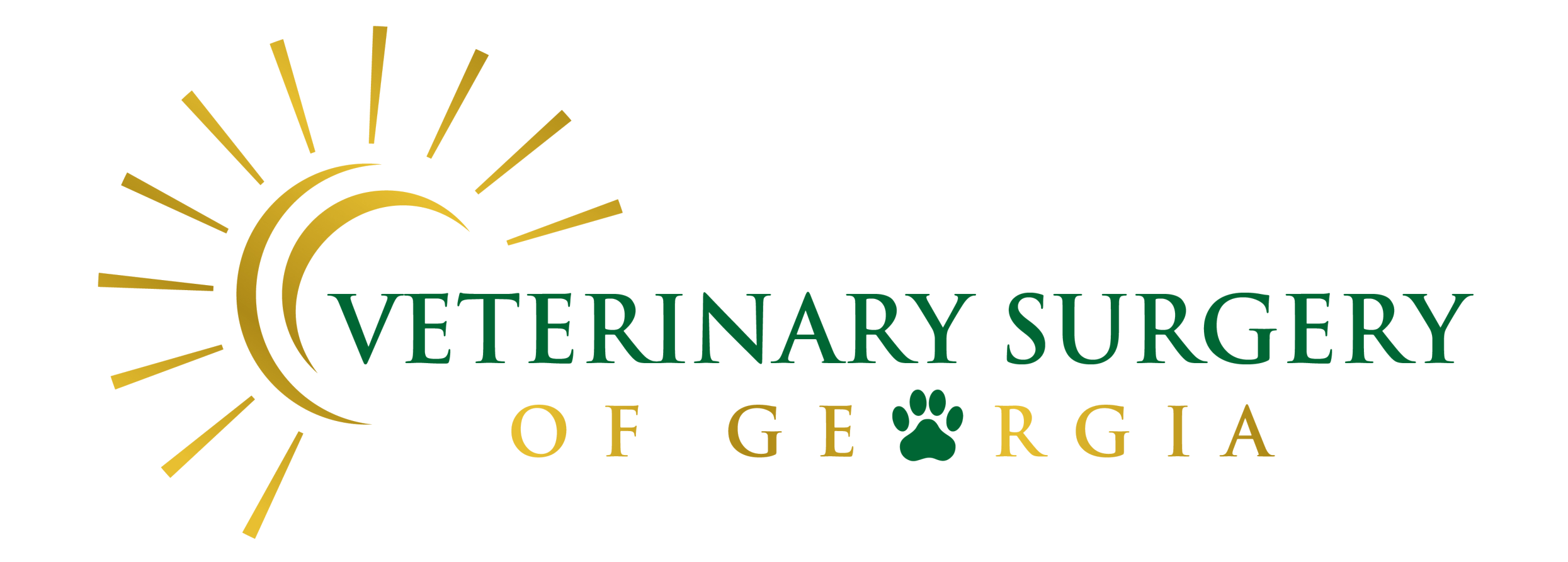Client Resources
Information for pet owners about cruciate ligament (CCL/ACL) tears, TPLO and other surgeries, as well as extensive post-operative instructions and frequently asked questions.
What is Cranial Cruciate Ligament (CCL) disease?
The CCL (cranial cruciate ligament) is akin to the ACL in people but there are some anatomical differences…
Post-op instructions for stifle/knee surgery (TPLO, LFS, MPL/patella)
Post-operative care is extremely important to achieve the best outcome following orthopedic surgery…
What is Tibial Plateau Leveling Osteotomy (TPLO) Surgery?
The TPLO procedure involves slightly altering the biomechanics of the joint so that there is no longer a…
What is FHO (femoral head and neck ostectomy)’?
FHO is a surgical procedure in which the head and neck of the femur is removed. The procedure is indicated in…
Thank you for your interest in Veterinary Surgery of Georgia!
I am a mobile veterinary orthopedic surgeon (board-certified). This means that I do not have my own facility where surgery is performed; rather I bring my surgical equipment into general practices and perform procedures at those locations. Information about various procedures I perform is below.
The clinic where I am performing your dog’s surgery is the primary contact for scheduling and surgical estimates. Please see the growing list above of general practices who use my services. Simply call the clinic of your choosing to make an appointment. Estimates for procedures may vary by location.
Animal Hospital of West Woodstock
Cumming Veterinary Clinic
Dallas Hwy Animal Hospital
Good Dog Veterinary Care – Marietta
Good Dog Veterinary Care – Smyrna
Happy Tails Animal Hospital
Haynes Bridge Animal Hospital
Hog Mountain Animal Hospital
Kennesaw Mountain Animal Hospital
Little River Animal Hospital
Midway Animal Hospital
Peach Paws Animal Hospital
Peachtree Corners Animal Clinic
Peachvet Pet Wellness
Pleasant Hill Animal Hospital
The Veterinary Clinic – Marietta
The Veterinary Clinic at the Avenues
Vickery Animal Hospital
Frequently Asked Questions
Will my pet need to be under general anesthesia and what risk is associated with that?
Yes your pet will require general anesthesia for most surgical procedures. The risk associated with general anesthesia is very low, but can never completely be eliminated in either people or animals.
We use great care when anesthetizing your pet. We used a balanced anesthetic protocol with the same drugs that are used in people. One person is dedicated to monitoring anesthesia (taking vitals signs at least every 5 minutes) at all times. Pulse oximetry, blood pressure, carbon dioxide monitoring, electrocardiography (EKG) are continuously monitored from the start of
anesthesia to the recovery period.
My pet has not had a bowel movement since surgery, should I be concerned?
Does my pet have to wear an e-collar (hard cone) following surgery?
It is very important to protect the incision from licking or chewing while it is healing. Your pet will be sent home with a hard cone to prevent these instinctive behaviors. It is important not to substitute a neck donut or soft cone for the hard cone, as they can frequently get around those. For some surgeries lower on the limb (such as TPLO), a Lick Sleeve (supply link) will be sent home to provide additional protection.
When will my pet come home after surgery?
Typically pets are discharged from the hospital in the afternoon after surgery. A long acting local anesthetic, Nocita (link to https://my.elanco.com/us/nocita) is infused into the surgery site, which eliminates the need for intravenous pain medications following the procedure (in most cases). If overnight care is recommended, your primary veterinarian will discuss options.
How will my pet be acting when I get him/her home and when should I start medications?
The night of surgery, your pet may be whiny, anxious, and restless, similar to a person who has recently had a sedated dental procedure. You can offer a small dinner, but often they will not want to eat until the next morning.
Antibiotics can be started the morning following surgery. Pain medications and sedatives (typically Trazodone) can be started the night of surgery or the morning after. It depends on the patient and how amenable they are to taking medications. The local anesthetic covers them well for pain until medications can be started.
